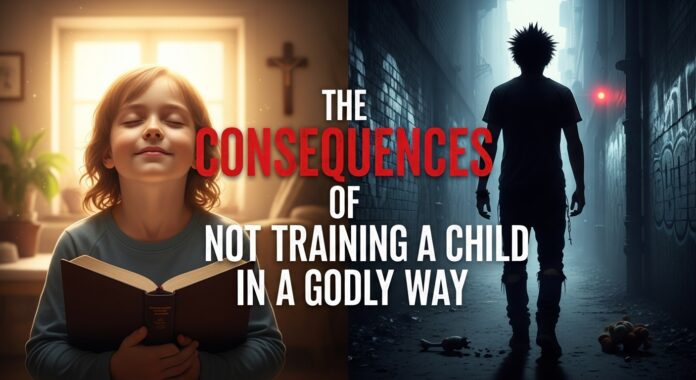"Train up a child in the way he should go, and when he is old he will not depart from it." - Proverbs 22:6
In today’s fast-paced world, many Christian parents in Zambia and across Africa are grappling with the challenge of raising godly children in the 21st century. The consequences of neglecting godly training in childhood extend far beyond immediate behavioral issues, affecting a child’s spiritual, emotional, and social development for life.
This comprehensive guide explores what happens when we fail to provide biblical foundation in our children’s lives, while offering hope and practical solutions for Christian families.
Understanding What It Means to Train a Child in God’s Way
Who is a Godly Child?
A godly child is not simply one who attends church or memorizes Bible verses. According to Scripture, a godly child is one who:
- Shows reverence and respect for God and His Word
- Demonstrates love and obedience to parents within biblical boundaries
- Exhibits fruits of the Spirit in age-appropriate ways (Galatians 5:22-23)
- Shows compassion and kindness to others
- Makes decisions based on biblical principles rather than peer pressure
- Develops a personal relationship with Jesus Christ
The Bible presents us with several examples of godly children in the Bible who demonstrate these qualities, providing us with clear models of what biblical child-rearing produces.
Godly Children in the Bible: Models of Faithful Training
Samuel: A Child Dedicated to God’s Service Young Samuel, trained under the priest Eli, demonstrates the power of early spiritual formation. His mother Hannah’s dedication and Eli’s guidance (despite Eli’s own parenting failures) produced a prophet who heard God’s voice clearly from childhood (1 Samuel 3:1-10).
David: A Heart After God Even as a shepherd boy, David showed characteristics that pleased God. His psalms reveal a young man trained to see God in creation, to worship through music, and to trust in divine protection rather than human strength.
Josiah: Righteousness from Youth King Josiah began seeking God at age 16, suggesting early spiritual training that bore fruit in his teenage years. By 20, he was actively purging idolatry from Judah (2 Chronicles 34:3).
Daniel: Unwavering Faith in Crisis Daniel’s refusal to compromise his faith in Babylon reveals training that went deep into his character. His godly foundation enabled him to maintain his convictions despite intense pressure to conform.
Timothy: Trained by Faithful Women Paul commends the “genuine faith” that lived first in Timothy’s grandmother Lois and mother Eunice before dwelling in Timothy (2 Timothy 1:5). This demonstrates the generational impact of godly training.
The Severe Consequences of Neglecting Godly Training
1. Spiritual Consequences
Loss of Spiritual Foundation Children not trained in godly ways often struggle to develop a genuine relationship with God. They may view Christianity as mere tradition rather than transformational truth, leading to:
- Weak prayer life or complete prayerlessness
- Inability to discern God’s voice or leading
- Susceptibility to false teachings and spiritual deception
- Eventual abandonment of faith in adulthood
Hardened Hearts Toward God Proverbs 29:1 warns that those who refuse correction will be “suddenly destroyed—without remedy.” Children who grow up without godly training often develop resistance to spiritual truth that becomes increasingly difficult to overcome with age.
2. Moral and Character Consequences
Compromised Value System Without biblical training, children default to worldly value systems that prioritize:
- Material success over character
- Personal pleasure over service to others
- Immediate gratification over long-term wisdom
- Social acceptance over moral conviction
Inability to Handle Temptation The Bible teaches that “everyone who sins is a slave to sin” (John 8:34). Children not trained in godly principles lack the spiritual tools necessary to resist temptation, often resulting in:
- Early experimentation with drugs and alcohol
- Sexual immorality and its consequences
- Dishonesty and theft
- Violence and anger issues
3. Relational Consequences
Broken Family Relationships Ephesians 6:1-3 promises blessing to children who honor their parents. Conversely, children not trained in godly respect often experience:
- Persistent conflict with parents and authority figures
- Inability to maintain healthy romantic relationships
- Difficulty forming lasting friendships based on trust and mutual respect
- Generational patterns of dysfunction
Social Isolation and Conflict Children lacking godly character training struggle with social relationships because they haven’t learned biblical principles of love, forgiveness, and service. This often leads to:
- Bullying behavior or becoming victims of bullying
- Inability to work well in teams or group settings
- Conflict resolution problems
- Lack of empathy and compassion for others
4. Psychological and Emotional Consequences
Identity Crisis and Low Self-Worth Children not grounded in their identity as God’s beloved often struggle with:
- Persistent feelings of inadequacy and worthlessness
- Seeking validation through unhealthy relationships or behaviors
- Anxiety and depression stemming from lack of purpose
- Fear of the future without faith in God’s providence
Lack of Peace and Security Philippians 4:7 speaks of “the peace of God, which transcends all understanding.” Children not trained in godly ways miss out on this supernatural peace, experiencing instead:
- Chronic anxiety about the future
- Inability to trust others or God
- Restlessness and dissatisfaction despite material comforts
- Vulnerability to mental health struggles
Also Read: Top 20 Richest Gospel Artists Who Started in Poverty: Inspiring Testimonies of Faith & Success
Benefits of Raising Godly Children: The Positive Alternative
Understanding the benefits of raising godly children provides motivation for parents to invest in biblical training:
Spiritual Benefits
- Strong personal relationship with Jesus Christ
- Wisdom beyond their years in decision-making
- Natural inclination toward worship and prayer
- Ability to hear and respond to God’s guidance
- Resistance to spiritual deception and false teachings
Character Benefits
- Integrity in both public and private settings
- Self-discipline and self-control
- Compassion and empathy for others
- Courage to stand for truth despite opposition
- Contentment and gratitude in all circumstances
Relational Benefits
- Healthy, respectful relationships with parents and authority
- Ability to form deep, meaningful friendships
- Skills in conflict resolution and forgiveness
- Future success in marriage and parenting
- Positive influence on others throughout their lives
Life Success Benefits
- Wisdom in financial management and stewardship
- Strong work ethic and reliability
- Leadership abilities grounded in servant-heartedness
- Resilience in facing life’s challenges
- Purpose-driven life focused on eternal values
Characteristics of a Godly Child in Practice
Age-Appropriate Spiritual Development
Early Childhood (Ages 2-6)
- Shows reverence during prayer and worship
- Demonstrates basic obedience to parents
- Begins to understand concepts of right and wrong
- Shows kindness to siblings and peers
- Enjoys Bible stories and Christian songs
Middle Childhood (Ages 7-12)
- Develops personal prayer habits
- Shows respect for church and spiritual activities
- Demonstrates honesty in difficult situations
- Exhibits self-control in tempting circumstances
- Begins to share faith with friends naturally
Adolescence (Ages 13-18)
- Makes personal decision to follow Christ
- Maintains moral standards despite peer pressure
- Shows wisdom in choosing friends and activities
- Demonstrates leadership in positive ways
- Plans for future with consideration of God’s calling
Raising Godly Children in the 21st Century: Practical Strategies
1. Establish a Biblical Foundation Early
Create a Christian Home Environment
- Begin each day with family devotions and prayer
- Play Christian music, including Zambian gospel artists like Pompi, Abel Chungu Musuka, and Peace Preacherz
- Display Scripture verses prominently in your home
- Make church attendance a non-negotiable family priority
Teach Through Everyday Moments Deuteronomy 6:6-7 instructs parents to discuss God’s commands “when you sit at home and when you walk along the road, when you lie down and when you get up.” This means:
- Using daily situations as teaching opportunities
- Connecting current events to biblical principles
- Explaining the “why” behind family rules and expectations
- Modeling godly behavior consistently
2. Address Modern Challenges with Biblical Wisdom
Technology and Media Influence In our digital age, parents must actively combat negative influences by:
- Monitoring and filtering internet content
- Discussing the biblical perspective on media messages
- Encouraging Christian music and entertainment alternatives
- Setting healthy boundaries around screen time
Peer Pressure and Social Media Help children develop strong identity in Christ by:
- Teaching them their worth comes from God, not social acceptance
- Helping them choose friends who share similar values
- Discussing the temporary nature of social trends versus eternal truths
- Providing a safe space for discussing difficult social situations
Academic and Career Pressure While encouraging excellence, maintain perspective by:
- Emphasizing character development over achievement alone
- Teaching that God has a unique plan for each child’s life
- Encouraging service and ministry involvement alongside academic pursuits
- Demonstrating that success includes spiritual and relational health
3. Implement Consistent Discipline with Love
Biblical Discipline Principles
- Discipline should aim at restoration, not punishment
- Consequences should be immediate, consistent, and fair
- Always explain the connection between behavior and biblical principles
- Follow discipline with reassurance of love and forgiveness
- Model the forgiveness and grace you expect them to show others
Overcoming Common Obstacles in Godly Child-Rearing
When Both Parents Aren’t on the Same Page
Creating Unity in Mixed-Faith Marriages
- Focus on areas of agreement regarding moral values
- Consistently model Christian love and grace
- Pray regularly for your spouse’s spiritual growth
- Avoid undermining your spouse’s authority while maintaining your convictions
- Seek counseling from mature Christian mentors when needed
Dealing with Extended Family Pressure
Navigating Cultural vs. Biblical Expectations In Zambian culture, extended family often influences child-rearing decisions. Christian parents must:
- Respectfully explain their biblical convictions
- Find ways to honor cultural traditions that don’t conflict with Scripture
- Teach children to show respect for elders while maintaining biblical values
- Create new family traditions that reinforce Christian principles
Addressing Past Parenting Mistakes
Hope for Parents Who Started Late It’s never too late to begin implementing godly training principles:
- Acknowledge past mistakes honestly with your children
- Begin implementing consistent biblical principles immediately
- Seek forgiveness from children for past failures
- Trust God’s ability to redeem and restore family relationships
- Consider family counseling with a Christian counselor if needed
The Role of the Church Community in Supporting Godly Child-Rearing
Finding the Right Church Environment
A church that supports biblical child-rearing should offer:
- Strong children’s and youth ministries with biblical foundation
- Parent education and support groups
- Mentorship programs connecting children with mature Christian adults
- Regular family-focused events and activities
- Clear teaching on biblical family principles
Utilizing Christian Education Options
Consider supplementing public education with:
- Sunday school and children’s church programs
- Christian schools or homeschooling cooperatives
- Bible clubs and Christian camps during school breaks
- Christian music lessons (many Zambian gospel artists offer training)
- Service opportunities that teach compassion and stewardship
Long-Term Impact: Breaking Generational Patterns
Creating Positive Generational Change
When parents commit to godly child-rearing, the benefits extend far beyond their immediate family:
Personal Legacy
- Children who become godly adults often become influential community leaders
- Strong Christian families contribute to church growth and community stability
- Godly training creates a ripple effect influencing multiple generations
Community Impact
- Godly children grow up to be honest business leaders, compassionate teachers, and faithful ministers
- They contribute to reduced crime rates and social problems
- They become change agents for positive moral influence in society
Kingdom Impact
- Children trained in godly ways often become effective missionaries and church leaders
- They raise the next generation with even stronger spiritual foundations
- They contribute to the advancement of God’s kingdom on earth
Practical Daily Implementation Guide
Morning Routines
- Begin with family prayer and Bible reading
- Play Christian music during breakfast preparation
- Speak words of blessing and encouragement over each child
- Set positive expectations for the day based on biblical principles
Evening Routines
- Discuss the day’s events through a biblical lens
- Address any behavioral issues with Scripture-based correction
- End with prayer, including gratitude and requests for wisdom
- Read Bible stories or Christian books appropriate for each child’s age
Weekly Practices
- Prioritize consistent church attendance and participation
- Plan family service projects to develop compassion
- Have regular one-on-one time with each child for deeper conversations
- Create family traditions that reinforce Christian values
Warning Signs: Recognizing When Intervention is Needed
Parents should seek additional help if they notice:
- Persistent rebellious behavior despite consistent discipline
- Loss of interest in spiritual activities that once brought joy
- Engaging in dangerous or harmful behaviors
- Symptoms of depression, anxiety, or other mental health concerns
- Significant academic or social problems at school
- Substance abuse or involvement with negative peer groups
Resources for Continued Growth
Recommended Reading
- “Shepherding a Child’s Heart” by Tedd Tripp
- “Grace Based Parenting” by Tim Kimmel
- “The Power of a Praying Parent” by Stormie Omartian
- “Instructing a Child’s Heart” by Tedd and Margy Tripp
Zambian Christian Resources
- Connect with local Christian family counselors
- Join parent support groups in your church
- Attend Christian parenting seminars when available
- Listen to teaching from mature Zambian Christian leaders
Conclusion: Hope and Restoration Through God’s Grace
While the consequences of not training a child in godly ways are serious and far-reaching, God’s grace provides hope for every family situation. Whether you’re starting with young children or seeking to restore relationships with older children who went astray, remember that God can “restore the years the locusts have eaten” (Joel 2:25).
The investment you make in godly child-rearing pays dividends not only in this life but for eternity. Your commitment to biblical parenting principles can break negative generational patterns and establish a legacy of faith that will influence your family line for generations to come.
As you face the challenges of raising godly children in the 21st century, remember that you’re not alone. God has promised to give wisdom to those who ask (James 1:5), and the Christian community exists to support and encourage families in this vital mission.
The consequences of neglecting godly training are severe, but the benefits of raising godly children are even more powerful. Choose today to invest in your children’s spiritual foundation. The eternal impact of your faithful parenting will echo through generations, contributing to God’s kingdom work on earth and ensuring your children’s names are written in the Book of Life.
“These commandments that I give you today are to be on your hearts. Impress them on your children. Talk about them when you sit at home and when you walk along the road, when you lie down and when you get up.” – Deuteronomy 6:6-7
About the Author: This article is brought to you by ZambianGospel.com, your source for Christian living guidance and Zambian gospel music that strengthens families and builds faith.



